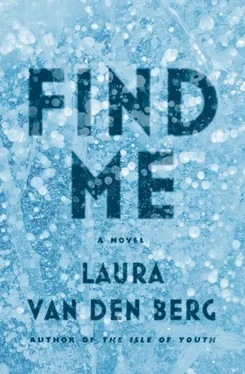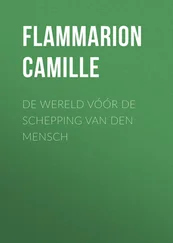My high keeps stretching on. I feel vibrations under my skin. My eyes are running, but in a way that almost feels good, like a toxin is being released.
“Don’t leave,” I say in the tunnel, reaching into the emptiness in front of me.
The voice disappears. Like my mother, it doesn’t give a damn what I want.
* * *
In the basement, I lean over and vomit on the floor. My body acts without warning, a sneak attack. The liquid splatters up the naked insides of my legs. Marcus throws my black sweatshirt over my shoulders.
“What did you give me?” I cry out to Darcie.
She is supposed to go in the tunnel next. She still has her clothes on, but from the look in her eyes, the expanding pupils, I can tell that she has already swallowed the liquid.
She stands in front of me, on the edge of the vomit. She grabs my chin and lifts my face, so we’re looking each other in the eye. “What have you been eating in the woods?” she says back.
I’m squatting and hunched, my lips wet. “Nothing you haven’t been eating.”
She lets go of my face and steps away, disgusted. Now her basement is going to smell. I wipe my mouth. Another wave is coming. I clutch at my stomach and feel something move inside me.
* * *
I keep going into the tunnel. Every time, I hear the singing. Every time, it fades into nothing. I don’t understand what I’m doing wrong. Once Darcie comes out crying so hard, she starts hiccupping. Marcus and I crowd around her and I pull her naked body close and feel her jerk in my arms, like something is trying to kick its way out.
Marcus has become a kind of facilitator. He folds our clothes and screws the eyedropper on the vial and waits on the other side of the door for whatever we bring back with us. I wonder what he and Darcie talk about when they’re alone and waiting on me. I wonder if she asks to see his face and if he shows her and if they come up with their own theories of the sickness, their own ideas about who or what is to blame.
“I’m scared of rabbits. Aren’t you scared of rabbits?” I heard Darcie say to him once.
“Rabbits are afraid of everything,” he replied. “That’s what makes them dangerous.”
Away from the tunnel, “billy goat” and “ax” and “wooden leg” keep playing in my mind. I arrange and rearrange the words like puzzle pieces, wait for them to start making sense. I lie on the mattress and smell that grass scent and look at my mother’s photo and try to remember. I am moved by the idea of her singing to me, but troubled by the question that must follow: why did she stop?
Sometimes, when I’m in the tunnel, I can picture her so clearly, I trick myself into thinking she’s right there, standing against the stone wall, and all I need to do is reach out and touch her.
If I think about the tunnel for too long, the Psychologist walks into the scene, with his electrodes and his Plácido Domingo records, and wrecks everything. These two people don’t belong together, I try to tell my memory, my unconscious mind, but it never listens and I have to put my mother’s photo away. I stay on my back and press my stomach, searching for the source of those distressing waves, and listen to the pipes in the Mansion groan.
The liquid from the eyedropper is not at all like guzzling Robitussin in the bathroom of the Stop & Shop. It makes the laws of gravity disappear. It makes my brain a blue jellyfish. It doesn’t blur the world, but vanishes it. I understand what those girls in Mission Hill meant when they talked about thinking they were going to dream forever, if that kind of absence can be called a dream.
In the Mansion, on my lesser days, I think I want to dream forever too.
* * *
In our room, on the second floor, Marcus and I come up with our own games to play.
A new version of hide-and-go-seek: we hide Twenty Thousand Leagues Under the Sea around the bedroom and close our eyes and guess where it is. Before we guess we are supposed to relax our thoughts, to not think about where the object might be but feel it. We are supposed to find its energy and follow that current with our mind. Does it feel hidden under the mattress? Does it feel hidden in a corner? Does it feel hidden in a person’s hands? Does it feel sweaty? Does it feel hidden outside the window? Does it feel cold? I guess right 50 percent of the time, because there are only so many places to hide the book.
Once I pretend my mother is hiding somewhere in our room. I shut my eyes and try to feel her energy. Is she under the sheet? Standing in the corner? Behind the door? Is she sitting in the windowsill, admiring the shapes of the trees? Is she underwater or on land? Is she anywhere near me?
* * *
The next time I’m in the tunnel, I hear the twins.
At first, everything is the same, dark and strange and cold, but then instead of the singing, Christopher is there, or his voice is there, and telling me all about the origins of my name. Old French and Latin, popularized by Puritans in the seventeenth century. They believed it meant to be “joyful in the Lord.”
“Are you joyful in the Lord?” It sounds like he’s speaking from the bottom of a stairwell, his voice tinny and small.
I stop. I can’t go forward or back. The path around me is disintegrating again.
Where are you? I want to ask. What’s it like there?
“Everything was okay at first,” Sam says, and I wonder how I asked the question without asking the question. “But now.” He stops and I know he’s waiting for his brother to finish his sentence, like he used to in the Hospital.
“But now,” Christopher says, “we are just so bored.”
The grand obituary, that is another game. We play it in bed at night, when we should be sleeping. We don’t share it with Darcie and Nelson. Here are the rules: we make up a name. This is the person who is getting the obituary. We go back and forth, adding detail after detail, until we have made the grandest obituary imaginable.
“Erica Hall,” I begin.
“Of Dover, Massachusetts,” Marcus says.
“At one hundred and thirteen years of age.”
“Passed away peacefully in her sleep, in a room overlooking the sea.”
“She battled no diseases. She felt very satisfied with life.”
“She felt she got plenty of time.”
“She is survived by three daughters and nine grandchildren.”
“She was the mayor of Dover and during her tenure she did everything right.”
“She put Dover on the map. Dover would not be Dover without Erica Hall.”
“She fed the homeless.”
“She believed in God.”
“She was a champion tennis player.”
“She traveled the world. To Africa, even.”
“She will live inside the hearts of all Doverians forever.”
I think about an obituary I once read in the newspaper, written by a woman who knew she was dying, so instead of leaving it to someone else, she wrote out her own, to be published after she was gone. In the obituary, she talked about how for a long time she was angry about dying, since she was only fifty and never smoked and it all seemed too soon, but by the time she wrote her obituary she wasn’t angry anymore. All she wanted was to share what she had learned about life.
I still remember the last lesson on her list: death will always take us by surprise.
In this game, Marcus and I are not allowed to use our own names. We will never be the recipients of a grand obituary.
My mother might.
* * *
The next time we’re all in the basement together, Darcie goes into the tunnel first. Marcus and I are sitting on the floor, our backs against the wall. I’m anxious for my turn to take the drops. I rest my head on Marcus’s shoulder. I roll my tongue around in my mouth. A lump of nausea grows in my stomach. We don’t hear Darcie moving in the tunnel, don’t hear the door opening, and even though there are no clocks in the Mansion, no way to be certain about the time, we start to feel sure she’s been gone for many hours.
Читать дальше












